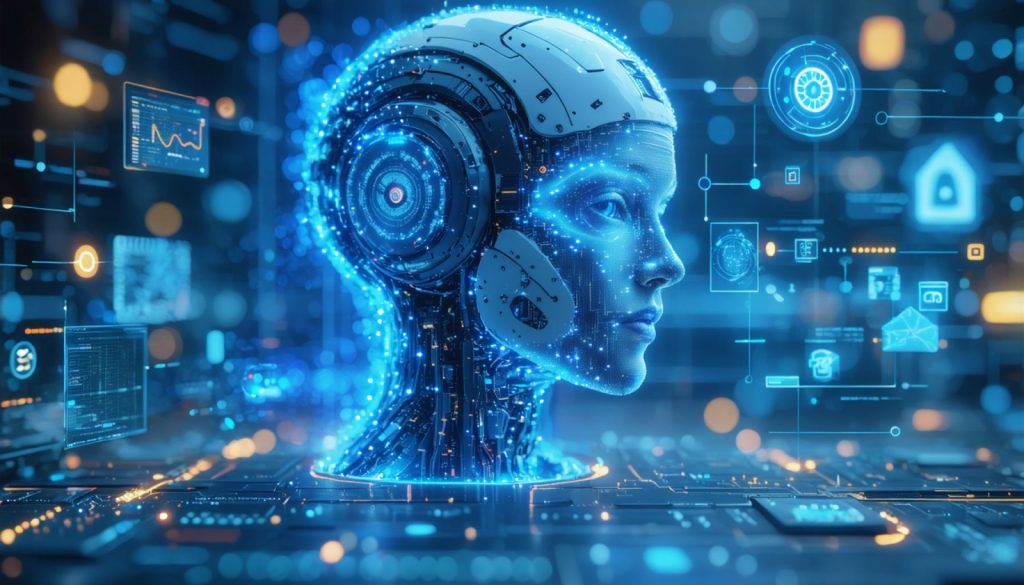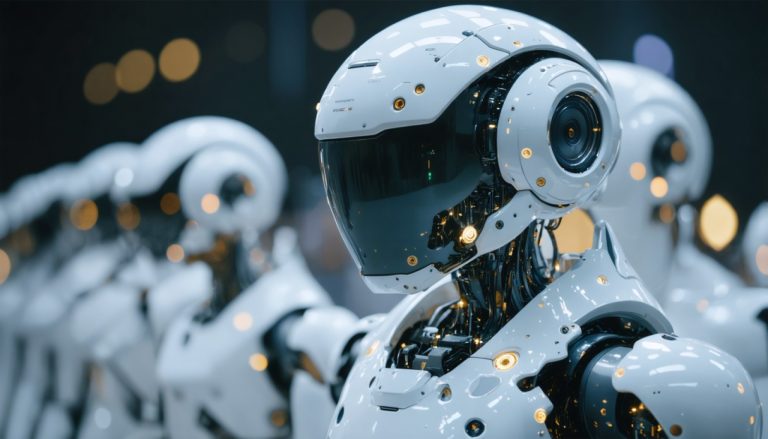
- Shopify integrates AI with a hiring mandate, using tools like Shopify Magic and Sidekick to enhance productivity.
- Bank of America employs AI across 90% of its workforce, improving productivity and client interactions.
- AI is predicted to revolutionize the construction industry, with leaders anticipating disruptions as the aging workforce retires.
- Retail showcases AI-driven customer engagement and marketing at Shoptalk’s Spring 2025 conference.
- Everyday technologies, like ChatGPT, become essential tools, offering personalized virtual assistance and surpassing traditional aids.
- The spread of AI highlights a necessary adaptation for businesses, promising advantages for both large enterprises and smaller businesses over time.
- AI’s expansion across sectors signals the dawn of digital intelligence as an indispensable aspect of modern business operations.
A crescendo of artificial intelligence echoes through the corporate corridors this week, heralded by bold moves and sweeping integrations. Shopify, determined to redefine its operational blueprint, recently unveiled a striking mandate under the leadership of CEO Tobi Lütke. No longer will teams seek new hires without a compelling case against AI’s competence to fulfill their roles. This audacious strategy underscores Shopify’s steadfast commitment to weaving AI into its workforce fabric, even amid the waves of layoffs that have marked its recent past. Tools like Shopify Magic and Sidekick are already at the forefront of this change, promising to bolster productivity and reshape job functions.
Concurrently, AI’s stormy advance is being warmly welcomed elsewhere, as illustrated by Bank of America’s sweeping adoption. Here, an incredible 90% of the 213,000-strong workforce now harnesses AI’s power to elevate productivity and streamline client interactions. With AI driving over a million interactive simulations annually, the transformation is palpable. It reflects a ubiquitous trend where financial institutions invest heavily in generative AI tools to gain a competitive edge, paralleling initiatives at giants like JP Morgan.
Another compelling narrative emerges from a study of the construction industry by Procore, revealing AI’s potential to revolutionize labor dynamics and operational efficiencies. As aging workforces signal a potential crisis with a 53% retirement rate predicted by 2036, AI and automation are primed to fill the widening gap. Forward-thinking leaders, who comprise 55% of the industry, foresee monumental disruptions over the next five years.
Retail, too, is riding the AI tide, as demonstrated at Shoptalk’s Spring 2025 conference. Here, leaders showcased how AI enhances customer interactions and enriches marketing creativity. Meta’s introduction of generative AI for advertising and Toys “R” Us’s innovative storytelling through OpenAI’s Sora platform are just glimpses of AI’s multifaceted role in reshaping retail experiences.
The allure of AI encapsulates everyday conveniences as well. Tech enthusiasts and professionals increasingly turn to AI chatbots like ChatGPT for myriad tasks – from synthesizing extensive research reports to offering a personalized virtual assistant experience. For many, these bots transcend mere convenience, becoming essential digital aides that assist with everything from crafting communication prompts to revolutionizing personal AI interactions by outpacing traditional tools like Siri.
Ai’s resonance across various sectors underscores a profound shift. As 2025 unfolds, AI isn’t merely a vogue but a vital gear in the machinery of modern business. Large enterprises are beginning to reap the rewards of their multi-million dollar investments in AI technologies. The cascade effect promises to democratize this tech, eventually filtering down to small and mid-sized businesses, ensuring that the extraordinary becomes the everyday for everyone.
In this AI-dominated narrative, the takeaway is clear. Adaptation is not a choice, but a necessity. Businesses must embrace AI’s transformative potential or risk obsolescence in an era where digital intelligence meets its long-awaited dawn. As sectors from tech to retail reimagine futures empowered by AI, the clarion call is for businesses of all sizes to harness this wave, steering toward a future not only supported by AI but augmented by its capabilities.
AI Revolution: How Artificial Intelligence is Transforming Industries And Redefining Workforce Dynamics
Understanding AI Integration in Modern Businesses
The integration of Artificial Intelligence across industries is reshaping corporate strategies, operational efficiencies, and workforce dynamics. From retail giants like Shopify to powerhouse financial institutions such as Bank of America, AI’s influence is undeniable. This article delves deeper into the multifaceted impacts of AI, exploring lesser-known facts, future prospects, and practical applications.
Shopify and the Future of Recruitment
Under CEO Tobi Lütke, Shopify’s innovative mandate could become a template for other organizations. By setting a precedent where new hires must demonstrate reasons why AI cannot perform their roles, Shopify is effectively pushing the envelope in AI-human workforce collaboration.
Life Hacks for Implementing AI in Hiring:
1. Evaluate the Role: Prioritize roles with repetitive tasks for AI automation.
2. AI Tools Evaluation: Ensure compatibility of AI tools like Shopify Magic with existing systems.
3. Training and Upskilling: Foster a culture of continuous learning and adaptation among employees.
Bank of America: Financial Transformation
Through AI, nearly all of Bank of America’s 213,000 employees use advanced technologies to enhance productivity and client interactions. This shift indicates that AI is adept at handling complex financial simulations and offering quick, data-driven insights.
Real-World Use Cases:
– Risk Assessment: AI algorithms can quickly process market data and predict trends.
– Customer Support: Chatbots enhance user experience by providing instant assistance.
– Fraud Detection: Machine learning models help identify irregular transaction patterns.
Construction and AI: Bridging the Labor Gap
The construction industry faces a potential labor crisis with a projected 53% retirement rate by 2036. AI’s potential to revolutionize this sector by improving safety, efficiency, and project management is immense.
Market Forecasts & Industry Trends:
– Adoption rates of AI in construction are projected to grow annually by 23% from 2023 onwards.
– AI-driven drones and automated machinery could reduce on-site human labor by up to 30%.
AI in Retail: Enhancing Customer Experience
Retailers are leveraging AI to personalize shopper experiences, and the trend is swiftly gaining momentum, as evidenced by innovations showcased at Shoptalk’s Spring 2025 conference.
Features & Spec Highlights:
– AI-Guided Shopping: Recommender systems personalize user experiences based on browsing behavior.
– Virtual Reality (VR) Fitting Rooms: AI integrates with VR for enhanced online shopping experiences.
AI Chatbots: Beyond Siri and Alexa
Tech enthusiasts are increasingly using platforms like ChatGPT for tasks beyond traditional assistants. These bots provide synthesised outputs of large datasets and perform complex user interactions, offering a blend of conversational ease and robust functionality.
Controversies and Limitations
Despite its benefits, AI integration comes with challenges. Privacy concerns, potential biases in algorithms, and the ethical implications of AI decisions necessitate careful consideration and regulation.
Actionable Recommendations
1. Pilot Programs: Start with pilot AI projects to identify potential benefits and challenges.
2. Collaboration Platforms: Invest in platforms fostering AI-human collaboration, optimizing both input and oversight.
3. Regulatory Compliance: Stay abreast of AI regulations and adopt an ethical AI framework.
Conclusion
AI isn’t merely a trend; it’s an empowering tool reshaping industries. As businesses navigate this era, embracing AI’s capabilities isn’t optional but imperative. With effective implementation, AI not only augments business operations but also transforms them, promising a future where extraordinary efficiencies and innovations become standard.
For more insights on AI’s role in business, visit Shopify and Bank of America.



